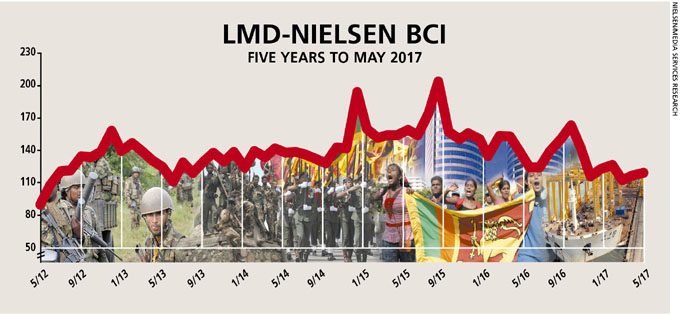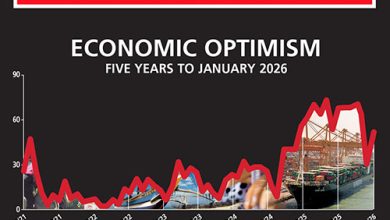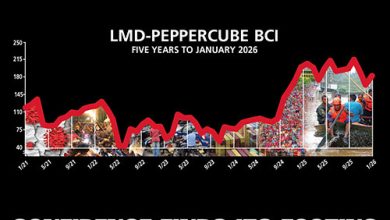BUSINESS SENTIMENT

The major news on the business front last month was that Sri Lanka would receive an annual EUR 300 million benefit from duty-free access to European markets with the GSP+ free trade concessions being restored from 19 May.
CONFIDENCE AT A VIRTUAL STANDSTILL
A mild uptick in sentiment does little to quell the apprehensions of corporates
Elaborating on the thinking behind reinstating the tariff concessions, officials from the European Union (EU) pointed to the incumbent administration’s willingness to adhere to global rights conventions that Sri Lanka is a signatory to – although they explained that the EU would continue to monitor the country’s progress in this area.
Some of the optimism leading up to the EU decision may also have filtered through to the corporate floor, which perhaps is why the LMD-Nielsen Business Confidence Index (BCI) has held its ground despite the multiple challenges facing the nation at this time.
 THE INDEX As expected, corporate sentiment remained flat in May and the BCI moved up by a sundry two notches to 119 from April. In May last year, the index stood at a much healthier 141 points. Nielsen’s Managing Director Sharang Pant explains: “While GSP+ has been a welcome development, business leaders feel the economy is still at a standstill.” He adds that “the short-term outlook for business is still weak,” which could be because of “falling disposable incomes due to inflation and taxes.”
THE INDEX As expected, corporate sentiment remained flat in May and the BCI moved up by a sundry two notches to 119 from April. In May last year, the index stood at a much healthier 141 points. Nielsen’s Managing Director Sharang Pant explains: “While GSP+ has been a welcome development, business leaders feel the economy is still at a standstill.” He adds that “the short-term outlook for business is still weak,” which could be because of “falling disposable incomes due to inflation and taxes.”
“Rising interest rates, a depreciating rupee and inflation are seen as hurdles to business prosperity although the long-term outlook for businesses looks positive… on the back of GSP+-driven exports and investments,” Pant states. Moreover, he asserts that “businesses expect the government to provide a clearer picture to potential investors on the state of the economy, policy changes and so on. A solution also needs to be found for the numerous strikes that cripple economic activity every now and then.”
THE ECONOMY At least a fifth of respondents say the economy will improve in the next 12 months, which is down from 28 percent in April. Albeit a slim majority (43%), the overriding expectation however is that economic conditions will deteriorate. The rest (36%) do not anticipate any change in the 12 months ahead.
Commenting on the state of the economy, one businessperson points out: “Currently, our economy is at a standstill. However, with large developments taking place in the real estate and hospitality sectors, things are looking positive moving forward as we can expect the tourism industry to pick up.”
BIZ PROSPECTS Sentiment appears to be mixed with regard to business prospects in the next 12 months – 40 percent of respondents say they expect their businesses to grow and the same number state that sales volumes will ‘stay the same as now’ although two-in-10 corporate execs feel that business prospects are bleak. Meanwhile, just one-in-five respondents say the immediate quarter appears strong for business with the majority (54%) expecting current conditions to persist.
INVESTMENT In terms of the investment climate, a lowly 15 percent of survey participants describe it as being ‘good.’ Conversely, more than half the sample population view current investment conditions in a negative light.
Highlighting the key factors impacting the investment outlook, a businessperson asserts that “the government is not giving a clear picture to potential investors on the current state of the economy and the investment climate. This has had a big impact on investor confidence.”
Another survey respondent laments: “Currently, interest rates are too high for companies to borrow to invest.”

WORKFORCE More corporates appear willing to expand their workforce with 26 percent (versus 20% in April) of those polled disclosing that they would look to welcome new recruits in the coming six months.
Nevertheless, the majority (66%) continue to tilt towards maintaining their employee numbers while the rest (8%) say they’ll have to resort to staff cuts.
SENSITIVITIES The depreciation of the rupee against the US Dollar, political imbalances and uncertainty, as well as falling consumer disposable incomes and rising raw material prices are cited as key sensitivities weighing on business and investment capacity.
Furthermore, a corporate executive observes that “with so many strikes taking place, it is impacting our already-underperforming economy, for which the government does not seem to have a solution. This is causing a lot of uncertainty among investors.”
However, another respondent sees the flip side: “The push by the government to regain the GSP+ trade concession is a positive move, which would help boost exports as well as attract more foreign investment.”
PROJECTIONS The index has stood its ground for the second month in a row, albeit at an uninspiring level of marginally under 120 basis points – that’s not even as high as the BCI’s all-time average of 130.
In fact, since Budget 2017 was presented in parliament in November last year, the barometer of business sentiment has shed 25 points.
With the reporting season in full swing, corporates and analysts alike will be watching closely as the trend for financial year 2017/18 unfolds. So far, the signs have been largely positive with the major private sector commercial banks releasing healthy first-quarter results.
Coupled with a somewhat bullish stock market and tapering inflation, the outlook for business confidence may seem brighter than it has been for some time.
That said, the stumbling blocks that are in the way of Sri Lanka’s push for economic advancement are likely to overshadow the positives – which is why we believe that the outlook for the BCI in the short term at least is murky.





